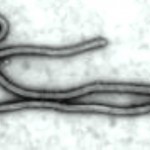 Researchers in the UK have highlighted the potential for the emergence of the new form of Ebola virus
Researchers in the UK have highlighted the potential for the emergence of the new form of Ebola virus
The Reston virus, a member of the Ebola virus family known to circulate in domestic pigs in Asia, may acquire mutations necessary to cause disease in humans and develop into a novel health threat, scientists say.
Researchers from the University of Kent in the UK have highlighted the potential for the emergence of the new form of Ebola virus.
They examined the differences between Ebolaviruses that cause severe disease in humans and the Reston virus that does not.
The Reston virus is known to circulate in domestic pigs in Asia and occasionally infect humans, and is currently the only member of the Ebola virus family not to have been reported as causing life-threatening disease in humans, researchers said.
Using computational analysis of the sequences of the genomes of Ebolaviruses and a computational prediction of the effects of sequence variations on virus function, researchers identified characteristic differences in a number of virus proteins.
The results suggested that only a few changes in one Ebolavirus protein, VP24, may be necessary to render the Reston virus into a virus that can cause human disease, researchers said.
There may be a risk therefore that Reston viruses acquire the few mutations necessary to cause disease in humans and to develop into a novel health threat, they said.
The findings were published in the journal Scientific Reports.
Source: Business Standard

















